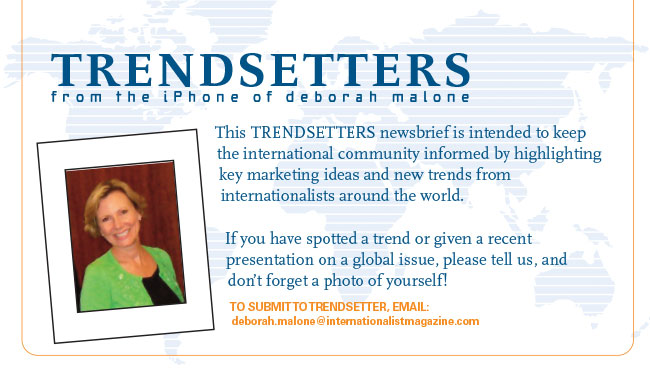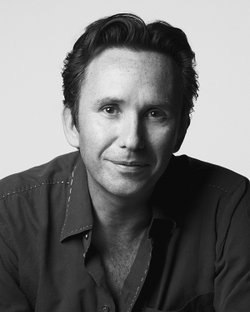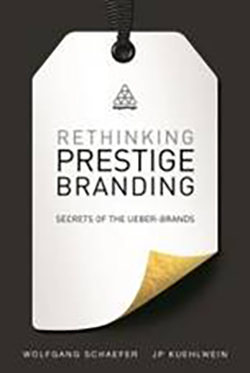

JP Kuehlwein

Wolfgang Schaefer

Rethinking Prestige Branding
Trendsetters: P&G's JP Kuehlwein Redefines the Power and Significance of Modern Prestige Brands
Ask JP Kuehlwein for a short definition of a contemporary prestige brand-- one that engenders almost cult-like following-- and he'll describe how people buy such brands with their hearts as well their heads, while their creators seem to apply magic as much as logic. He'll add that modern prestige brands make us "long to belong," and they can be of any size and come from any category at any price point.
According to Kuehlwein, these brands-- whether Grey Goose Vodka, Apple, TOMS, Nespresso, MINI, Gucci, Aesop, or Cirque Du Soleil-- are not only desirable, but they have ever-increasing social and cultural significance. He says, "They are no longer just beacons of status or building blocks of our identities; they are morphing more and more into mythical fixtures and leaders, sometimes creating movements not unlike political parties. They have created and become narrative constructs that inspire our public discourse, provide meaning to rally around or to reject-- affecting, influencing, and yes, often guiding our lives, not just materially or functionally but emotionally, ethically and even spiritually."
This may sound like a tall order for any brand, and especially allusive to someone trying to unlock their marketing secrets, but now help is on the way. After some 4 years, 75+ interviews, 150 cases studied, and countless conversations, JP Kuehlwein has co-authored a book with Wolfgang Schaefer, Chief Strategic Officer of SelectNY, one of the world's leading premium branding networks, called Rethinking Prestige Branding. In fact, this intelligent, comprehensive book covers so many of today's shifting brand dynamics that it encourages the even the most experienced marketer to rethink his or her perspectives-- particularly as they unveil the 7 Secrets of these successful brands.
Their premise is that both the concept and context of prestige is changing, so it is no longer unusual to find items that were once considered premium at stores or in categories where they were not expected in the past-- such as a Missoni line in Target or water that retails at $15 a bottle. Interestingly, as luxury becomes more mass, consumers are also rethinking consumption. Rather than owning more, they now prefer to curate a portfolio of experiences and items that express who they are and what they stand for.
Technology, too, is changing how premium brands go to market and how they are experienced. "Exclusivity" is no longer the domain of the prestige brand. Consumers, instead, are looking for interaction, and for brands to do right by them and their world. This presents a challenge, but also an opportunity to brands to reach what Kuehlwein and Schaefer call "mythical status."
In fact, JP Kuehlwein and Wolfgang Schaefer-- both German by birth-- have added a subtitle to their book, Rethinking Prestige Brands-- Secrets of the Ueber-Brands. The idea of Ueber or ?ber rang true for their thoughts on prestige. For those who forget their Introduction to Philosophy course, German philosopher and author Friedrich Neitzsche created the term "Ueber-Mensch" (over-man or often translated as super-man) in his novel, Thus Spoke Zarathustra. The term is associated with someone who is willing to take risks for the sake of humanity, while establishing his own values, and in the process, influences and inspires the lives of others.
Ueber-Brands or modern prestige brands are therefore less self-important or aggrandizing, and instead are now more self-aware and self-reflecting. Among those addressed in the book across a broad spectrum of categories throughout the globe are: Food-- Innocent, Lakrids, Red Bull, Nespresso; Hospitality and Entertainment-- Hoshino Resorts, Cirque Du Soleil; Transportation-- Tesla, MINI, Harley Davidson; Fashion, Beauty, Accessories-- Freitag, Brunello Cucinelli, Aesop, Chaumet); Household Goods (Detergents & Soaps)-- The Laundress, Yuan.
Kuehlwein says of Ueber-Brands: "They don't elevate their followers by putting others down, but by staying a step ahead and true to their core. And they shine not just around their products, but through them. And this is why Ueber-Brands can be of any size and come from any category at any price point. What puts them on a higher level and secures their stellar position is a sense of discrimination paired with dedication, and this is as priceless as it is progressive."
Progressive indeed! Both Kuehlwein and Schaefer also see these brands in the context of a new "Enlightened Capitalism"-- where making money isn't something to frown upon but neither is it something to glorify in and of itself. Where profit has to serve a purpose, and greed is not good unless it does good--more than filling someone's pockets. Where creating value is not the opposite of having values, and where any enterprise has to really undertake something worthwhile-- something that is bigger than simply sustaining itself.
MORE

